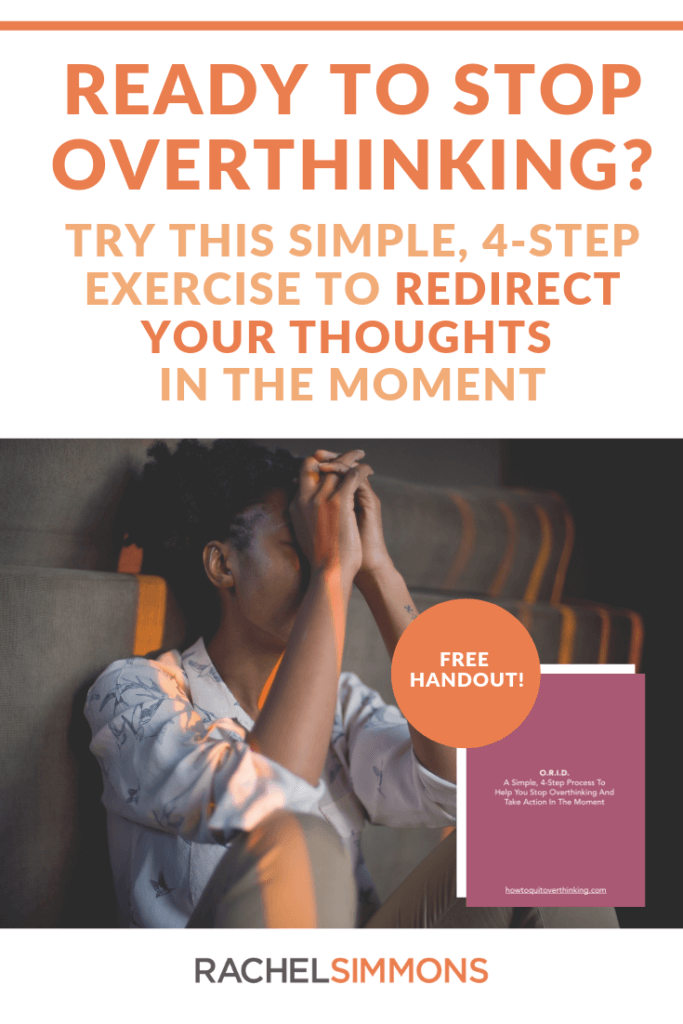Ready To Stop Overthinking? Try This Simple, 4-Step Process
I'm a chronic overthinker. I do it on the treadmill, before bed, and in the car. I overthink about my relationships (Why didn’t she make time for me this summer?), my work (I can’t believe she gave me that feedback), my daughter (What if her learning issues hold her back?). If there was a “Can’t Stop Overthinking” Olympics, I’d medal.
During these times I’m pretty sure my brain looks something like this:

First identified by Yale professor Susan Nolen-Hoeksema, overthinking, or “rumination,” is a common response to stress. It’s defined as repetitively focusing on the causes or consequences of a problem.
Tell me if this sounds familiar: Your boss critiques your performance at work, and you spend the rest of the work day ranting and raving about them in your head.
Even hours later, as you try to fall asleep, you can’t stop thinking. You fantasize about telling your boss how you really feel. You spiral in guilt wondering if your boss is actually right. You swing back to vengeance, imagining a new, better job.
Short on time? Download your overthinking handout now and try this exercise later:
As time passes, your ruminating spirals—what was once a minor professional blip becomes a much more daunting problem.
“How dare she? Who is she to judge me? She has it in for me.”
“Everyone probably thinks I’m incompetent now.”
“She’s right. I knew I wasn’t fit for this kind of high-stress environment.”
“How am I going to pay rent when I get fired?”
This is what overthinking does to us—it takes a problem we might begin to address and instead throws us down a rabbit hole.
So what can we do to pull ourselves out?
First, we have to acknowledge and debunk one of the most pervasive overthinking myths:
Myth: “Overthinking Helps Me Solve My Problems”
I’ve taught workshops on overthinking all over the country—I have worked with everyone from grade schoolers to leaders at a Fortune 50 company. No matter where I am, I hear the same thing:
“Overthinking is how I get to the bottom of things. It helps me solve my problems.”
This is false. Overthinking diminishes your problem solving skills. It makes you less effective at dealing with your stress.
Before I understood rumination, I was convinced overthinking was good for me. Like the hundreds of people I’ve taught, I was sure overthinking gave me the control and wisdom I needed to solve my problems.
But studies over the last three decades consistently show that overthinking:
- is a major catalyst for depression, especially in women—in fact, it’s considered the reason why women suffer from depression at twice the rate of men.
- weakens your problem solving ability -- when you overthink, you second-guess yourself and lose confidence in your abilities.
- reduces your motivation to change your life, keeping you going in circles instead of moving forward.
- elevates your anxiety
- is linked to binge eating
When we overthink, some part of us truly believes we’re on the verge of a simple insight or decision that will magically fix whatever’s gone wrong.
But it’s like going back to the fridge over and over again, convinced this time we’ll figure out what will make us feel full. We’re searching for a solution (and often drowning in self-criticism along the way) when we could be taking productive steps to help us move on with our lives.
Want To Actually Stop Overthinking? Try This Simple 4-Step Process
[BTW: If you’d like me to walk you through this process, definitely check out my free workshop: Why Our Kids Overthink, How We're Making It Worse and What We Can Do About It. Click here to watch!]
O.R.I.D. is a problem solving method that was developed to help individuals and groups break free of indecision and problem solve with clarity. I have found it a useful tool in redirecting thoughts that are becoming too ruminative.
I’ve found this process is most effective when you take the time to write down your answers. Writing gives us critical distance from our thoughts—often the simple act of getting our thoughts down on paper is enough to stop identifying with them.
I made you a handout if you want to try it for yourself.
Follow along with your free O.R.I.D. handout:
Step 1: Objective. What happened? What do you know to be true?
Your first line of questions should be objective: consider what you actually know to be true.
So, if I’m ruminating about my friendships (and thinking, Why am I always the one who has to make plans with other people? Why don’t they call me, too? Does everyone else just hang out all the time? Why am I alone?) I have to focus on the facts. They are:
- I don’t have a lot of plans on my calendar
- I have not been in close touch with friends for a while.
- I have not been invited out by anyone in a while.
What events have occurred? If you’re overthinking a relationship or conversation, what was actually said or done? What did you say or do in reply?
Stick with the who, what, where, when and how. No whys. Don’t start editorializing (Why don’t people call me to hang out? Should I move out of this town!?). Remain on the solid ground of evidence.
Step 2: Reflective. How do you feel?
Your next step in stopping your overthinking train is to reflect: How do you actually feel about this? In my case, I felt disappointed, lonely and worried. Okay, and sad and frustrated.
Step 3: Interpretive. What does this mean?
The next round of reflection should be interpretive: What does this mean for you? What is the impact of having few social plans?
For me, it messes with my confidence and makes me question how likable I am. It even makes me wonder if living in my town is the right choice.
This, in turn, makes me want to withdraw from other people.
Step 4: Decisional. What are you going to do about it?
Your final questions to pose yourself are decisional. What are you going to do about this?
What is one small step—just one—that you can take to move closer to a solution? Can you write down a version of what you might say in person? Is there anyone you can ask for help?
Often, this vital step is what we’re avoiding when we’re trapped in an overthinking spiral. Most of us don’t enjoy confrontation—it’s far easier to live inside of our heads, rehearsing what we would say or do, if given the opportunity.
Don’t let yourself be trapped in that space. Choose one small, non-terrifying step you can take forward, then commit yourself to doing it.
For me, it was texting two friends to see if they wanted to have a drink. I understood that making a plan with others would help me feel a little less lonely. I picked up my phone and sent a message. They got back to me right away and made a plan for a few days later.
Ready for a deeper dive?
Introducing How To Quit Overthinking: An Online Course Designed To Free You From Repetitive Negative Thoughts And Help You Take Action In The Moment
I’m thrilled to announce the online version of my How To Quit Overthinking workshop, which I’ve taught to thousands of teens and adults all over the world and now adapted into a self-paced, fully personalizable online course. I know what works, and I'm not going to waste your time.
When you register for How To Quit Overthinking, you’ll gain immediate access to:
- 5 video lessons of skill-building training with me
- Step-by-step instruction in creating your Overthinking Profile, a comprehensive blueprint of how you overthink
- Strategies to help you quit second guessing, facepalming and overthinking your relationships
- Your custom Overthinking Protocol, a personalized plan to help you quit overthinking in the moment
Think of it this way: How much time would you save if you didn’t overthink? If you’re not sure, spend a day or two paying close attention to your negative thoughts.
Ask yourself: What else could I be doing with this time? Would you be working, connecting with someone you love, or getting s*^& done?
When you’re ready, click here to join me in How To Quit Overthinking, a deep dive into overthinking learning, reflection and interactive exercises. We’ve designed the content to steer you towards a thorough understanding of your overthinking habits and give you the tools to navigate your way out.
Overthinking isn’t a switch you turn on and off. As with any skill, managing your overthinking is a lifelong practice, a muscle that I’ll help you develop and flex over time.
Click here to learn more about How To Quit Overthinking.
Share this post on Pinterest:

